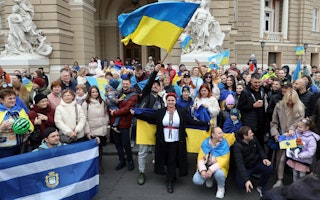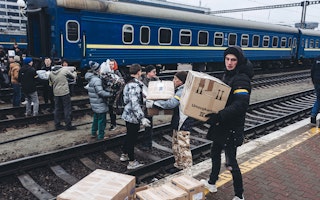Q&A: “The Biggest Challenge Is the Uncertainty”

The two-year anniversary of Russia’s full-out invasion of Ukraine looms. After a largely stalled counteroffensive, Ukraine’s military finds itself locked in a grinding faceoff with Russian forces, losing hard-won ground as the West debates whether to send additional aid. Meanwhile, the battle to preserve and rebuild Ukrainian society goes on.
Oleksandr Sushko is executive director of the International Renaissance Foundation, Open Society’s philanthropic arm in Ukraine. We spoke with him about the state of civil society in his country and the challenges ahead on the eve of the second anniversary of the war.
You were just attending the annual Munich Security Conference, amid much debate about whether and when the U.S. and other Western nations will continue to support Ukraine against Russia’s attacks. What was the mood there?
The mood at the conference was ambivalent. Ukraine should be supported, but there is a shortage of support which can help us survive this war. Russia is adjusting its capabilities and what it can supply to the front lines of the conflict. The West can help supply Ukraine, but timing matters. The future was not looking very optimistic at the conference—especially as regards the U.S. Congress. The challenge is daunting, but we must continue to work.

We read a lot about the state of affairs on the battlefield. What can you tell us about how civil society in Ukraine is holding up?
The biggest challenge is the uncertainty. Living with so much uncertainty, it is difficult for people to build long-term strategies for rebuilding. People are exhausted after two years of war. Ukraine has lost millions of people, and there may be new out-migrations from the country. That is probably the biggest threat after the bombs themselves.
This applies to civil society as well. Many of the activists and community leaders are tired. Some of our most talented people may leave. Many of those who left in the immediate aftermath of the invasion have not returned; we had hoped some would come back. This amounts to a critical shortage of people to carry on the work of civil society.
Despite all this, we see now a massive mobilization of civil society groups. We support hundreds of initiatives across the country, bringing people together to support Ukraine. Our grantees work to mobilize support for Ukraine around the world, especially in Europe and the United States—to provide economic assistance, political assistance, and broaden the scope of international solidarity.
How has the foundation adapted strategies since the invasion?
Our major purpose has been to protect and develop civil society and maintain democracy. If Putin succeeds with his invasion, there will be no democracy, no civil society. So, we focus all our efforts toward not letting Putin win.
As a foundation, we support people suffering from the war, and fighting the war. There are over a million war veterans already, and there will be many more. We try to help them organize, improve their capacity to deal with the government in accessing services, and develop policies to help them. There is also a huge number of people who have been displaced internally. We seek to help them as well—those who lost their homes, lost relatives, and those who left the country. We work to help them feel comfortable where they have relocated.
Thousands of children have been forcibly relocated to Russia. This is a war crime. We continue to work with the international justice system to document this and other war crimes, collecting data and evidence to share with war crimes prosecutors and human rights champions and hold Russia accountable for the atrocities being committed.
And we continue to support independent media providing critical reporting on what is happening in our country. The ad market for the press collapsed during the first month of the war; within a matter of days, working journalists lost their income and had their homes and offices destroyed. We helped many of them to survive the first year of the war, providing shelter and a safe place to work.
When we spoke in those first months following the all-out invasion, your foundation had moved operations west in order to escape the bombing. But you soon returned. How are working conditions for you, your staff, and grantees today?
Our cities are under fire from Russian missiles. There are regular threats to civilians across the country. We cannot avoid this new reality. But we came back to Kyiv after about three months—along with so many others. Despite the continued bombing, the number of residents in Kyiv is almost back to the pre-war level.
We made all the necessary changes to adjust our lives to these new circumstances. Our offices are open for meetings and public events. People continue to fight through many challenges, including mental health challenges. But our staff continues working. We never stopped, even during the most dangerous moments of the war. We do our best to keep our staff resilient, to ensure that our foundation remains a leader of civil society, dedicated to Ukraine’s survival as a democratic state.
We know that to many this may look like a regional conflict. Sometimes, it may not resonate for the rest of the world. But this is a critical test of democracy’s ability to withstand autocratic regimes’ attempts to reverse democracy. If Russia prevails, it will have an impact on the behavior of China toward Taiwan, North Korea toward South Korea, among other cases. If Russia prevails, it will have a disruptive effect on the whole global order. That is why it is so important for us to concentrate our efforts to help Ukraine prevail. This is our hope. This makes us strong.

